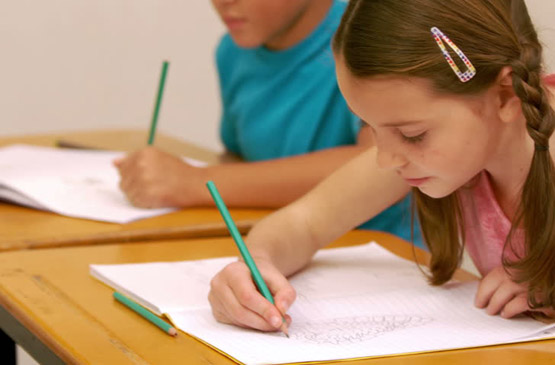Examination
REPORT CARD DETAILS
As we follow the NCERT syllabus in the lower and upper primary stage, uniformity in the assessment structure, examination and issue of report cards is followed from class III to VIII. The detail components of the scheme are mentioned below for easy understanding and implementation.
Scholastic Area
The assessment structure and examination for classes III to VIII have been prepared in view of the provisions of RTE-Act 2009 and comprises of two terms i.e. Term-1 and 2 as explained below:
| Subjects |
TERM-1 (100 marks) (1st half of the session) 20 marks Periodic Assessment + 80 marks for Half Yearly Exam |
TERM-2 (100 marks) (2nd half of the session) 20 marks Periodic Assessment + 80 marks for Yearly Exam |
| Language -1 |
PA 20 marks |
Half Yearly Exam |
PA 20 marks |
Yearly Exam |
| Language -2 |
PeriodicTest 10 marks with
syllabus covered till announcement of test dates by school
• Note Book Submission 5 marks at termend
Sub Enrichment 5 marks at termend
|
Written exam for 80 marks with syllabus covered till announcement of Half Yearly exam dates by school |
Periodic Test
• 10 marks with syllabus covered till announcement of test dates by school
• Note Book submission 5 marks at termend
• Sub Enrichment 5 marks at termend
|
Written exam for 80 marks with syllabus coverage as below:
Class VI: 10% of 1st term covering significant topics + entire syllabus of 2nd term
Class VII: 20% of 1st term covering significant topics + entire syllabus of 2nd term
Class VIII: 30% of 1st term covering significant topics
|
| Language -3 |
| Mathematics |
| Language -1 |
| Science |
| Social Science |
| Any other Subjects |
Subject Enrichment Activities :
These are subject-specific activities aimed at enhancing the understanding and skills of the students. These activities are carried out throughout the term, however, they should be evaluated at the term-end.
Languages :
Aimed at equipping the learners to develop effective listening and speaking skills. The language teachers devise their own methods and parameters for assessment of the languages.
Mathematics :
Students are selected according to their performance in mathematics
Science :
Practical work and activities in Science are undertaken as suggested by the NCERT Syllabus and Text Books.
Social Science :
Map or the project work may be undertaken as suggested by the NCERT Syllabus and Text Book.
| Grading Scale for Scholastic Areas (Classes III-VIII)
(School will award grades as per the following grading scale)
|
| MARKS RANGE |
GRADE |
GRADE POINT |
| 91 – 100 |
A1 |
10.0 |
| 81 – 90 |
A2 |
9.0 |
| 71 – 80 |
B1 |
8.0 |
| 61 – 70 |
B2 |
7.0 |
| 51 – 60 |
C1 |
6.0 |
| 41 – 50 |
C2 |
5.0 |
| 33 – 40 |
D |
4.0 |
| 21 – 32 |
E1 |
3.0 |
| 0 – 20 |
E2 (Needs improvement) |
2.0 |
Co-Scholastic Activities (Classes VI-VIII) :
For the holistic development of the student, co-curricular activities in the following areas are carried out by the teachers and will be graded term-wise on a 3-point grading scale (A=Outstanding, B=Very Good and C=Fair).The aspect of regularity, sincere participation, output and teamwork be the generic criteria for grading in the following co-scholastic activities:
- a) Work Education - Work Education refers to skill-based activities resulting in goods or services useful to the community
- b) Art Education (Visual & Performing Art)
- c) Health and Physical Education (Sports/Martial Arts/Yoga/NCC etc.)
Discipline (Classes VI-VIII) :
The students will also be assessed for the discipline which will be based on the factors like attendance, sincerity, behaviour, values, tidiness, respectfulness for rules and regulations, attitude towards society, nation and others. Grading on Discipline will be done term-wise on a 3-point grading scale (A=Outstanding, B=Very Good and C=Fair)

